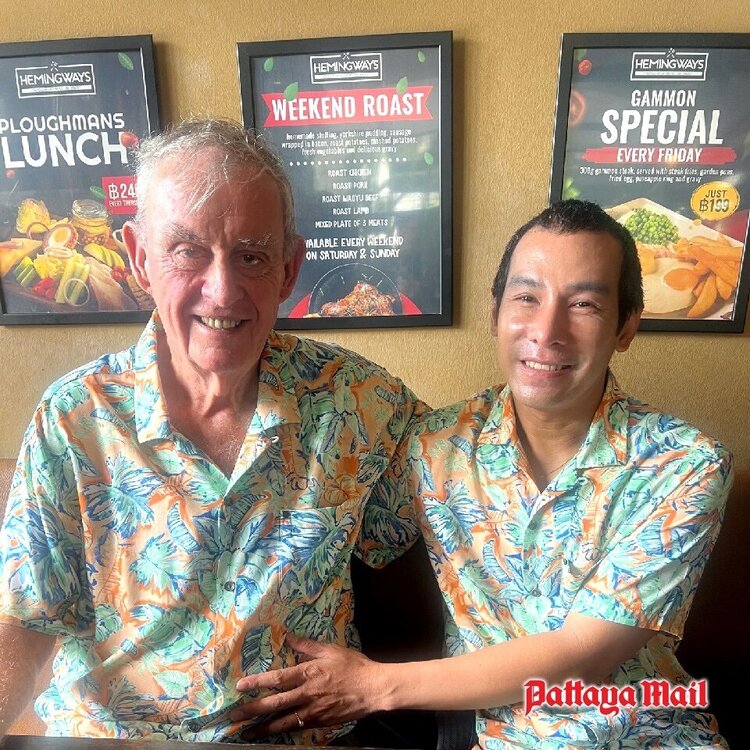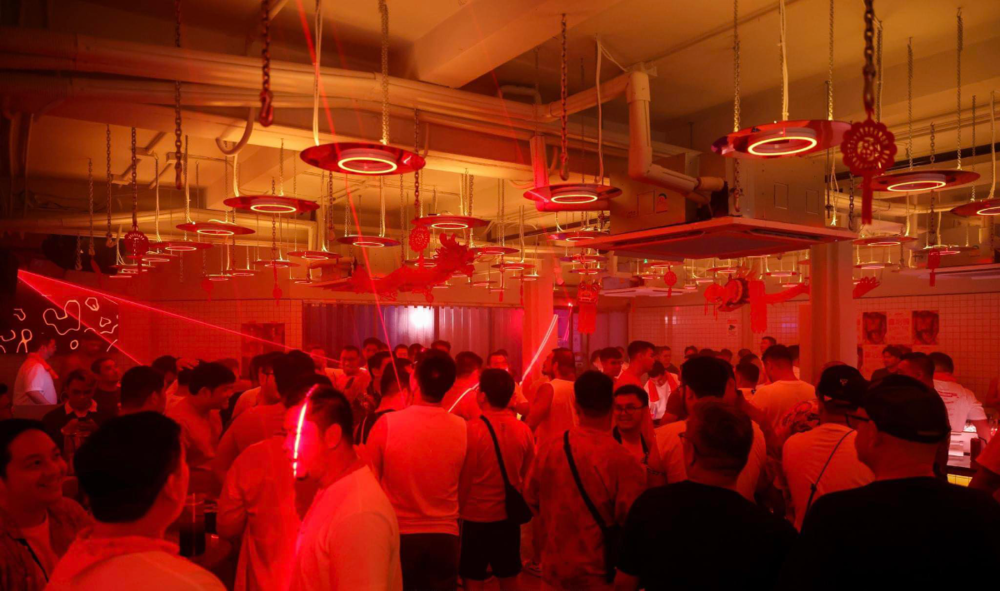
reader
Members-
Posts
10,274 -
Joined
-
Last visited
-
Days Won
262
Content Type
Profiles
Forums
Events
Everything posted by reader
-
Price for one hour oil in Saphan Kwai appear to range from 350 to 550 depending on shop. Generally, the shops on the opposite side of road from Big C are in the lowest tier but KK Massage on Suthisan Winitchai rd. Is offering a promotion rate of 250 today only. It is rumored that One Spa is boosting rate to 500 but have not yet confirmed this. I believe K-Man is top at 550.
-
From Manila Standard Cebu Pacific said Wednesday it is expanding its Cebu hub with direct flights to Masbate and Bangkok starting October 2024. The airline unit of the Gokongwei Group will operate flights between Cebu and Don Mueang-Bangkok three times weekly or every Monday, Wednesday and Friday starting Oct. 2, 2024. Meanwhile, flights between Cebu and Masbate will start to operate on Oct. 25, 2024, three times weekly as well or every Monday, Wednesday and Friday.
-
From Pattaya Mail By Barry Kenyon The answer is a resounding yes, but on Thailand’s terms. Prime Minister Srettha Thavisin has championed the “new generation” of longstay visas such as the Long Term Residence, the revamped Elite, the as-yet cloudy Destination Thailand Visa and – for those working legally – income tax concessions and specialist visas such as the four-year Smart. Together with the improvements for short stay tourists (well over 90 percent of all new arrivals will shortly get 60 days visa-exempt on entry) the reforms are imaginative if sometimes confusing to the general reader. Updated information about them comes variously from the Cabinet or the Tourist Association of Thailand or the Board of Investment or the Immigration Bureau. There is no single source for updates or corrections. But many expats are outside of these initiatives as they cannot afford the fees. For example, the Long Term Residence requires retiree foreigners to have an income of US$80,000 a year, or even heavier financial investment, and the five year Elite registration is now US$25,000. As a result most expats, retirees and/or married to Thais for the most part, live here on annually renewable extensions of stay based on an original non-immigrant visa. The annually-renewables are worried about the Thai Revenue’s recent reinterpretation. Section 41 of the tax code, long ignored but now required, means that Thai tax residents (anyone spending more than 180 days in a year here) must obtain a tax identification number and fill in a tax form not later than March 2025 to cover their overseas income transmitted to Thailand in the calendar year 2024. If that income was pre-taxed in the first country which had a double taxation treaty with Thailand, and can be proved by documentation, it is unlikely the cash will be taxed again in Thailand. But the Revenue has not categorically confirmed that commonly-repeated assumption. Not to mention that the detail varies in the 61 countries which have concluded tax agreements with Thailand. What will happen to the annually-renewables if they stick their heads in the sand and hope for the best nobody knows. Maybe nothing, at first, as there are much bigger fish to fry out there. Thailand tends to be a country of strict laws and poor enforcement strategies. It has been suggested that some visa renewals could be linked to registration with the Revenue, but there is no sign of that happening any time soon. It’s worth recording that Thailand is one of around 140 countries which have agreed to share with each other international banking transactions of individuals under the Organization for Economic Cooperation and Development which opposes tax havens and money laundering. If you flee to Cambodia or the Philippines as a wannabe tax exile remember they are OECD members too. The notion that your banking is a private and confidential affair which is none of anybody else’s business is rapidly becoming an anachronism. The Revenue in recent days has separately publicized its intent to spread the tax net even further from 2025 by suggesting that tax residents in Thailand should be taxed on income they earn globally, whether transmitted to Thailand or not. This would apparently require a change in the law and is best left alone until further clarified. But, again, most annually renewables don’t own villas in Spain or any other country, salting away the rents in offshore accounts. The best defence remains to prove in documentary style your income wherever it is. Prime Minister Srettha said this week, “Revenue collection is very important and the finance ministry is also considering additional measures to stimulate the economy.” He is eyeing the big fish who have used loopholes in the Thai tax system for decades to avoid paying the Revenue. Annually-renewables are rarely, if ever, big fish in this context. But the problem is that they swim the same river.
-
Lots of photoshopping but above my pay grade. you pose the perennial question: do they promise more than they can deliver?
-
From Thai PBS World In Cambodia, anything Thai – from TV series and music to celebrities, consumer goods, and even the language – was once hugely popular. Despite this popularity having waned in recent years, many Cambodians still recognise the value of learning Thai. When it comes to language learning, many Cambodian students are much better at learning Thai compared to other languages, due to the inherent similarities between Thai and Khmer, as the two languages share roots in Pali and Sanskrit, with around 70% of their vocabulary having similar meanings. Sentence structures are also the same, allowing students to communicate in daily life with ease after just three to six months of study. Heng Hongry, 33, a Thai language teacher at Krung Tap Thai School in Phnom Penh, emphasises the challenge of advanced learning in Thai. “The difficult part is pronunciation. It’s crucial because, if you pronounce a word incorrectly, it causes confusion”. Each syllable in Thai carries one of five distinct tones. Even a slight shift can completely change the meaning. By learning Thai, students gain the ability to communicate effectively while also delving into the culture, society and history of Thailand. This deeper understanding can foster stronger connections between people in both countries and, potentially, beyond. At the Royal University of Phnom Penh, students in the Thai department learn about “Thainess” through various activities, including “Sunthorn Phu Day” and a Freshman Welcoming Ceremony. “Actually, we don’t have that kind of ceremony in Cambodia, but we want our students to get an idea of Thai activities”, said Assoc. Prof. Dr. Samphos Hem, Head of the Thai Department. He added that students have opportunities to showcase their abilities in the Thai language and their knowledge of Thai literature. There are student performances, in which they practice Thai dance and performance arts. The most important thing is that, through practice, students can learn various forms of Thai art and language. Hence, they gain a clear understanding of Thai culture. Continues at https://www.thaipbsworld.com/how-thai-cultural-diplomacy-works-in-cambodia/
-
NOTE — This state news agency press release was picked up my wire service worldwide and now the government is faced with an embarrassing situation. File under TIT. From Pattaya Mail By Barry Kenyon Like most media, Pattaya Mail jumped the gun by stating that the 30 days on arrival by air, land and sea was doubled to 60 days at the beginning of the month. We apologize for our carelessness. The statement by the Ministry of Foreign Affairs has to be confirmed by various bureaucracies prior to implementation. The Ministry’s September 1 start date for the new DTV (Destination Thailand Visa) and the reduction in medical insurance required by O/A retiree visas and extensions of stay is also unconfirmed. Both subjects could be delayed further if linked to a “reconstruction” of retiree visas as suggested in the original press handout.
-
NOTE — I’ve been told by a member who is also an avid fare watcher that other carriers have done the same in recent past. From CNN LondonCNN — The boss of Qantas Airways has acknowledged the “anger” of thousands of customers who were sold tickets for already-canceled flights. “Everyone feels pain at the anger,” Qantas CEO Vanessa Hudson told CNN’s Richard Quest in an exclusive interview at an airline industry conference in Dubai Monday. “It’s not just me; (it’s) 25,000 people that work for us as well. Because not only (did) we let our customers down, we let our people down.” Last August, Australian regulators accused Qantas in a lawsuit of selling tickets for more than 8,000 flights that the airline had already canceled — affecting more than 86,000 customerQantas agreed last month to pay 120 million Australian dollars ($79 million) to settle the lawsuit. Of that, about 20 million Australian dollars ($13.3 million) will go to the affected customers. The remaining 100 million Australian dollars ($66.5 million) is a fine — the biggest ever for an Australian airline, according to Reuters. Hudson, who took the helm at Qantas in September, soon after the lawsuit was filed, told Quest the airline is focused on repairing its relationships with passengers and staff.
-
Chinese LGBTQ+ emigres look to build a new life In Bangkok
reader replied to reader's topic in Gay Thailand
Agree. And kudos to LA Times for interesting and well-developed article with some good photography. -
From CNN Now that we carry around personal devices with high resolution, 4K screens in our back pockets, the seatback screens on airplanes can seem more than a little disappointing. Even if you’ve opted for the priciest seats on the airplane, your inbuilt cabin screen is likely going to be poorer quality than the screen on your iPhone. That’s where airplane seat manufacturer Collins Aerospace and inflight entertainment provider Panasonic Avionics step in. The two aviation powerhouses recently joined forces to reimagine the future of airplane TV and movie-viewing, via a swanky concept called MAYA. MAYA, which stands for “Most Advanced Yet Achievable,” is an ergonomic business class seat that comes equipped with an Astrova Curve 45-inch ultra-wide, ultra-high-definition OLED display.
-
From LA Times By Stephanie Yang BANGKOK, Thailand — In 2019, business was booming for Owen Zhu. He was one year into his new career in real estate, showing Bangkok properties to Chinese investors. Then the pandemic halted travel and spending. Even now, Chinese buyers are slow to return. The exception has been one group that has since become Zhu’s specialty: LGBTQ+ clients looking to build a new life for themselves outside China. “Most of them are buying to live in or to retire in — not like many straight people or friends, who are prioritizing investments,” Zhu, 40, said. Before the pandemic, Zhu estimates, about one-fourth of his clients were LGBTQ+. Now they make up two-thirds of his customer base. As China has clamped down on queer representation and advocacy, Bangkok, long the “gay capital” of Asia, has offered visitors a reprieve from the conservative culture back home. Here, the thriving nightlife of gay bars and clubs draws many potential buyers to look for apartments near the city center, Zhu said. Zhu, who is also gay and from China, bought an apartment in Bangkok in 2017 for his eventual retirement. As friends started asking his advice on how to make their own purchases, he quit his job in Chinese media to help them find properties full time. As his clientele has changed, so has Zhu’s marketing on Chinese social media. In between property listings, he now shares updates on efforts to legalize same-sex marriage and surrogacy in Thailand. With demand growing, Zhu said he hopes to start a housing complex catering to gay Chinese in the next few years. Continues at https://www.latimes.com/world-nation/story/2024-05-30/chinese-lgbt-emigrants-thailand
-
From The Thaiger he United Kingdom Foreign Office issued a travel warning to British touristsheading to Thailand ahead of the summer holidays: “Behave, or end up in jail!” The Foreign Office advised British holidaymakers flying to the Land of Smiles to be cautious of the new visa rules. “From 1 June 2024, British passport holders arriving by air or land can enter Thailand without a visa (visa exemption) for tourism and short-term businessengagements for a period not exceeding 60 days. If you intend to stay longer (for work, study, or other reasons), you need to obtain a visa before you travel. “If you stay beyond the period of your visa, you will be fined 500 Thai baht per day, up to a maximum of 20,000 baht. You risk being held in detention.” You also risk being “deported at your own expense” and “banned from re-entering Thailand for up to 10 years.” The Foreign Office warns that “conditions in detention centres can be harsh.” It adds that holidaymakers can find more information on visas or entry requirements by contacting the Royal Thai Embassy or the local Immigration Office. Tax duty The UK Foreign Office has explained that there are strict regulations regarding goods that can be brought into and taken out of Thailand. Holidaymakers must declare any items that may be prohibited or subject to tax or duty. The Foreign Office has specifically issued a warning about importing cigarettes, reported National World. “It is illegal to import more than 200 cigarettes per person into Thailand. This is enforced at customs on arrival. If you go over the limit, you could be fined 10 times the value. Furthermore, your cigarettes will likely be confiscated.” The UK Foreign Office also revealed details regarding passport validity requirements. “Your passport must remain valid for at least six months from the date of entry into Thailand. Entry to Thailand may be denied if your passport is damaged or has missing pages.
-
From Pattaya Mail A foreign tourist fell to his death at a 39-story luxury condominium on Thepprasit Road, South Pattaya on June 3. The victim, identified as Mr. Roman Vlasenko, a 38-year-old Russian national, was discovered in the parking area beside the building, wearing blue sportswear and lying face down with severe injuries to his body. Thantawan Khontaratkul, the condominium’s security guard, recounted hearing a loud noise resembling something hitting metal barriers while patrolling the area. Upon investigation, residents directed him to the spot where the incident had occurred. There, he found Mr. Vlasenko, who had jumped to his death. Security camera footage showed Mr. Vlasenko taking the elevator from the ground floor to the 29th floor, which features a common area garden with a scenic view. Subsequently, he made the fateful decision to jump from the building, resulting in instantaneous fatality upon impact with the ground. Further scrutiny of security recordings unveiled disturbing behaviour preceding the incident. Mr. Vlasenko, reportedly intoxicated and armed with a water gun, was seen harassing office staff within the condominium during the recent Songkran festival. Investigations into Vlasenko’s circumstances revealed he had been residing on the 21st floor of the condominium, where he had fallen behind on rent payments for several months. Additionally, his credit card had been restricted, potentially adding to his distress. The embarrassing incident of drunken misconduct during Songkran festivities may have exacerbated his emotional turmoil, ultimately leading to the tragic decision to end his life by jumping from the building. ======= From Pattaya News An American tourist was found dead on Tuesday morning after falling from the seventh floor of a hotel in Pattaya. Pattaya police received a report of the incident at around 6:06 AM on June 4th. Officers and rescue workers arrived at the unidentified hotel located on Soi Thappraya 15 to find the deceased victim, identified by police as Mr. Michael Jeffery Bruggink, a 43-year-old American tourist, lying face down in a narrow space behind the hotel’s parking lot. The victim was topless, and there were no signs of violence on his body nor forced entry in his hotel room. However, authorities discovered cannabis and a significant number of syringes in the room, which has subsequently been sealed off for further forensic examination. Hotel security guard Mr. Supornchai Hadkham, 34, reported that he did not witness the fall and was unsure how or when it happened. He noticed Mr. Bruggink while patrolling the area and immediately contacted authorities after finding the tourist unresponsive. he cause of the incident is currently under investigation, with police considering the possibility of both accidental fall or suicide. Forensic examination will be conducted to determine the exact cause, and the victim’s embassy will be notified.
-
From Pattaya Mail By Barry Kenyon Bob and his longtime partner Oh in their favorite restaurant. American Robert (Bob) Pelletier is one of that large group of farang who settled in Pattaya around the beginning of the century. Born in 1939 at the port city of New Bedford, Massachusetts, he spent some years in Fall River, more famous perhaps for the alleged but unproven murders of Lizzie Borden. Bob gained a degree in accountancy – “money is always an interesting subject” – and joined the National Guard before being called up on active duty in the army air corps. He had an early military career to become Assistant Chief of Protocol and resigned in 1963. Bob then settled into a financial career, working for many years as a dealer consultant or chief financial officer for various companies including General Motors. He discovered Thailand in 1997 as a tourist and took up Pattaya residence in 2004. He had already met his permanent Thai partner Oh and they have lived together ever since. “What matters in gay or straight relationships is love, commitment and letting the other person have air to breathe,” says Bob, “and we have our own friends and hobbies.” He adds that, as you get older, you need someone to lift you up literally and figuratively. Retirement years, even in Fun City, can be boring with nothing to do. Bob is a keen bridge player and was one of the 30-plus foreigners arrested for gambling in 2016. “It was a very unfortunate mistake by the authorities and we were never charged or taken to court,” he explains, “but several members were in their nineties and found the several hours of confinement at the police station extremely upsetting as they needed their medicine.” Bob has substantial experience of condominium affairs as a member, and twice chairman, of the management committee. “It’s interesting voluntary work and I dealt mostly with executive affairs as the day to day running is the responsibility of a management company,” he recalls. Bob still sits on the committee and, whilst we were talking, two tenants came to tell him about a water leak and a noisy neighbor. Bob is a good listener and certainly needs to be. Most years Bob returns to America for a month or so to visit his extended family. I asked him what he finds attractive about living in Pattaya. “The hospital system here is good, quality restaurants are plentiful and the locals are mostly friendly and good natured.” But he adds that the best places to live tend to deteriorate over time. “Pattaya was green and clean when I arrived here, but the traffic chaos and the urban sprawl are obviously negative factors these days. But you learn to live with it all.” And the gay scene? “Sure, that’s changed a lot too. When I first arrived, all the action was in gay bars and issues like same sex marriage were never mentioned. Even holding a gay pride rally was controversial to some people. These days, gay life is open and sexual orientation is becoming an irrelevance in Thailand which is an excellent development.” Bob concludes, “Even in your eighties you can be out and proud.”
-
From Pattaya Mail By Barry Kenyon Some gay activists are not so sure about a new national headcount of sexual minorities in Thailand to help design a better living and welfare policy for them. Chadlerm Jandee said, “Sexuality is a very wide spectrum and LGBTQIA+ stands for Lesbians, Gays, Transgenders, Queers, Intersex, Asexuals and others.” He added that many people who have gay experiences don’t necessarily identify as homosexual. Thai premier Srettha Thavisin said the forthcoming marriage act for same sex partners is not the end of the story. “We then want to pursue gender recognition (the right of people to choose their identity on official documents) and sex worker laws,” he explained. The new survey of the National Statistical Office and others will be based on provincial households and online surveys of Thais aged 15 and above. There have already been many attempts in Thailand to pinpoint gay numbers. Ipsos, the market research organization, this year estimated 9 percent of 71 million Thais, but others have suggested anywhere from 3 percent to over 20 percent. It is generally agreed that younger Thais, in particular the GenZ generation presently aged up to 27 years, are more likely to identify with a sexual minority than older citizens. Research into gay numbers worldwide has a long history. American Alfred Kinsey in the 1940s toyed with a 10 percent ceiling and was the first to recognize the spectrum of sexuality on the scale of 0-6. In Nazi Germany, SS leader Heinrich Himmler set up a committee to combat homosexuality and ordered the expansion of Dachau concentration camp after being told gays were 2 percent of the adult population. Porranee Phuprasert, assistant manager of ThaiHealth, said the new survey will collect data on health, mental condition, living conditions and relationships in an attempt to combat stereotypes and discrimination. He said gays still face hostility in the workplace and from gay bashers. Meanwhile, the prime minister is keen to boost revenue by maximizing international tourist arrivals during the 2024 Global Gay Pride Calendar. Ann “Waaddao” Chumaporn, an organizer of gay pride events, said more gay people were prepared to come out these days. “20 years ago, there were no mobile phones, no Facebook, no widespread internet, no nothing. There were only posters that I had put up in gay bars,” Ann concluded. “If there are more Thais now identifying as gay or belonging to a sexual minority, that’s no surprise.”
-
A friend and I accompanied Jason1975 to The One Club last night, arriving at 10pm. The only thing I’d add to his review is that they need to develop some new stage activities before show begins. At the moment, they just have a few guys standing on stage at a time but not doing anything in particular to hold your attention. Management had done a good job of refurbishing interior.
-
From CNBC Mexico’s left-leaning climate scientist Claudia Sheinbaum has secured enough votes to become the Latin American country’s first-ever female president. The country’s electoral institute published a rapid count estimate late Sunday night saying that Sheinbaum had won the presidential election. The estimate has a margin of error of +/-1.5%, the institute said. A protégé of her long-time ally and mentor Andrés Manuel López Obrador, Sheinbaum is now poised to succeed AMLO when his six-year term as president comes to an end on Oct. 1. In a speech after the preliminary results, Sheinbaum said the government will have “republican austerity, financial and fiscal discipline and autonomy,” according to a CNBC translation, adding that the country “will never have an authoritarian or oppressive government.”
-
From The Thaiger Starting December 1, Thai Airways (THAI) will resume its daily direct passenger flights between Brussels Airport and Bangkok. This eagerly awaited route, which was suspended during the Covid-19 pandemic, significantly enhances Brussels Airport’s intercontinental offerings. After a four-year hiatus, Brussels Airport is thrilled to welcome back THAI, a former member of its prestigious airline community. The airline has once again chosen Brussels Airport as its hub in the Benelux region, much to the delight of Belgian travellers. From December 1, THAI will operate a daily service to Bangkok using the state-of-the-art Boeing 787-8. Known for its fuel efficiency and reduced noise impact, this aircraft will serve both tourism and business travellers. The return of the Thai airline marks a significant enhancement to Brussels Airport’s intercontinental network, providing direct access to one of Asia’s most vibrant destinations. In related news, Airbus has inked a deal with THAI to retrofit its fleet of 20 A320ceo aircraft with premium reclining business class seats. This marks Airbus’ first-ever cabin retrofit for a single-aisle fleet in this part of the world.
-
The owner has obviously learned something in marketing 101: put your best face out front.
-
Where should I go for a late-June / early-July trip?
reader replied to frazzle's topic in Gay Thailand
Will only comment on Bangkok. if anything, Thailand—and Bangkok in particular—is renowned for its massage industry. That’s not to say he it doesn’t have a noteworthy sauna scene but it’s a distant second attraction. If you have a fairly good body, you’ll probably have rewarding experience at the at the top saunas where the younger crowds gather. Otherwise, places like 39 Underground and Heaven saunas might be better choices. Massage shops on the other hand accommodate all comers. It would be a mistake IMO not to liberally sample the offerings. -
Search pornhub or other sites for Mexico City metro.
-
You’re both right. The queue is actually for “Beef,” a dance club for the beefier set. Apparently they have many admirers because those awaiting admission weren’t necessarily beefy and represented a cross section of ages. https://www.facebook.com/beef.bkkbar/?mibextid=LQQJ4d Bi Polar on the other hand is geared toward ladyboys and their admirers. https://www.facebook.com/bipolarsilom/ (A tip of the hat to Jason1975 for setting me straight—well on that matter anyway)
-
From Thai PBS World In its effort to promote gender diversity, Thailand will not stop at legalising same-sex marriage, which it will later become effective this year, according to Prime Minister Srettha Thavisin today. “Thailand will continue to support gender diversity after successfully passing the marriage equality bill. We are looking forward to pushing for gender recognition and sex worker laws,” he said. He was speaking at the start of Pride parades at the National Stadium. With him were Pheu Thai party leader Paetongtarn Shinawatra and other senior party members. Srettha also mentioned equality regarding gender honorifics, allowing LGBTQ+ people to choose their titles on official documents. Srettha did not, however, provide details about sex worker legislation. Visitors from around the world are celebrating Pride Month in Thailand this June. Events are scheduled to take place in several Thai destinations, as Thailand works to become a top “LGBTQ+ Friendly Destination.” Bangkok Pride, starting today, will continue for a month and will include many LGBTQ+-related fora at various venues in Bangkok and other provinces. Aiming for gender equality and the creation of an environment that nurtures diversity, Thailand is committed to empowering all citizens, regardless of age, gender, religion, nationality, or social status, and welcomes tourists from around the world, according to the government, according to government spokesperson Chai Wacharonke. Chiang Mai is also celebrating Pride Month with parades, concerts and art exhibitions. On Koh Samui, in Surat Thani, the “Pride Nation Samui International Festival”, on the theme of “Let’s Join PRIDEradise”, will take place between June 24and 29. A pride parade and music festival will take place on June 29on Chaweng Beach.
-
Frim The Thaiger In an unprecedented global crackdown, a leading cybercrime organisation, described as the world’s most sophisticated hacking group, has been successfully dismantled. This victory comes as a result of a tireless combined operation between Thai and US security services. The operation orchestrated by the FBI and Thailand’s Technology Crime Suppression Division (TCSD), resulted in the arrest of three top-ranking members of the international cybercrime syndicate. The fallout of the arrests, unlike any seen before, is set to have a significant impact on global cybercrime activities. The syndicate had been operating extensive illegal activities involving unauthorised system access, theft of confidential information, and cryptocurrency fraud across borders, wreaking havoc on the global digital economy. The arrested individuals are now facing serious charges under the Computer Crimes Act, which could equate to a decade-long sentence for each charge. Officers searched a target house in Bang Lamung District, Chonburi Province, and three condominium rooms in Na Jomtien. They found 7.5 million baht in cash, both Thai and foreign currencies, 13 luxury watches including 3 AUDEMARS PIGUET watches worth over 30 million baht, 23 pieces of jewelry worth over 50 million baht.
-
The lure of gaining admittance to Bi-Polar, the club that occupied the space that once housed my beloved Nakarat, reached must be an all-time high Friday night when 100+ queued up behind the velvet rope that stretched to the Croom hotel entrance and overflowed beyond. It’s become a destination on Soi 4.
-






